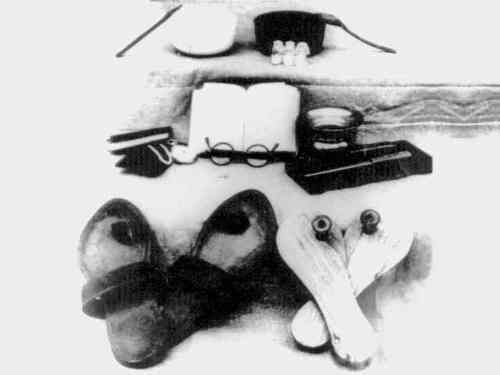January 6
“Love and exclusive possession can never go together. Theoretically, where there is perfect love, there is perfect non-possession.”
-Gandhi ( (Modern Review, October 1935, p. 412)
(Pictured: Gandhi’s only possessions at the time of his death.)
Nonviolence meant more to Gandhi than “not being violent.” It was closer to a state of perfect love. When we really love, it requires more of us than just refraining from not hurting others, we actually become a force for good. It is a promise as much as a trust: by developing our nonviolence, we work toward becoming love itself–serving and deeply nourishing those around us in the way that only love can do.
With perfect nonviolence as a visionary, and seemingly impossible goal, Gandhi was keenly aware that he needed a little extra help. How does one embody a perfect state of love, imperfect as we all are? Luckily for him, and for all of us, he held a little secret about power: instead of grasping outside and holding onto what we see in front of us–be it a partner or a resource of some kind–we can let go of, or detach ourselves from something, or more importantly, someone. The space left where we were holding onto something is like a pocket of power, which when released becomes ours to direct toward our highest goals.
Does this mean that we have to have as few possessions as Gandhi in order to be nonviolent, or to love? Not at all. The idea can best be summed up in a conversation that Gandhi had with a young student who came to join his movement. When the student asked him if he had to give up all of his possessions, Gandhi replied that he did not, but what was required was something harder–to renounce the possessor.
No one and nothing is my possession. Is this really that radical? When you think about it, it seems obvious, but in the complexity of relationships with the people and things in our lives, there is a natural tendency of the mind to grasp onto these unquestioningly–”mine, all mine,” from romance to new purchases. We grow in our capacity to love by interrupting that habit of mind. Gandhi is not only showing us with his life that this is true; he is daring us to try it.
Experiment in Nonviolence:
Reflect on what “belongs” to you. How can you “renounce the possessor” in terms of these things and redirect your use of them toward service?
Daily Metta 2015, a service of the Metta Center for Nonviolence, is a daily reflection on the strategic and spiritual insights of Mahatma Gandhi in thought, word and deed. As Gandhi called his life an “experiment in truth,” we have included an experiment in nonviolence to accompany each Daily Metta. Check in every day for new inspiration. Each year will be dedicated to another wisdom teacher.









